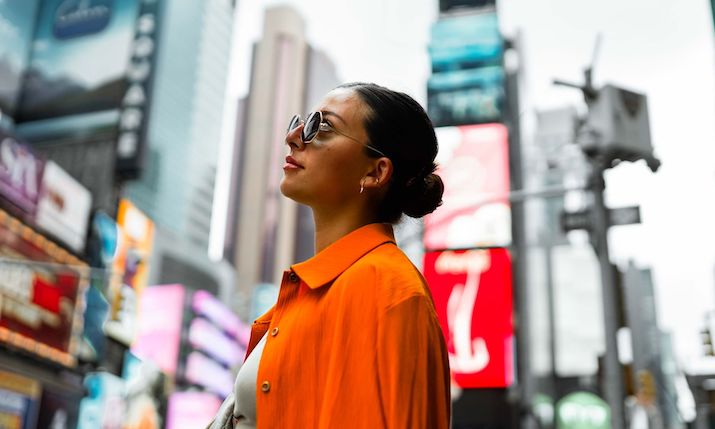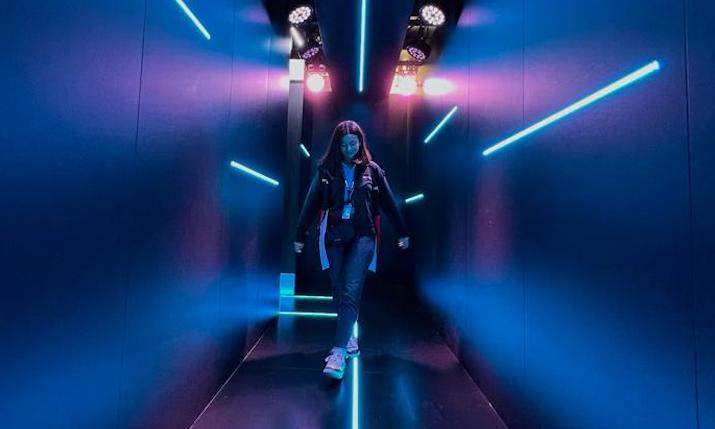Stepping Stones: Aurora’s Phoebe Augier shares her journey so far working in production

Some downtime exploring NYC at the Formula E New York E-Prix
Phoebe Augier, production coordinator on Formula E at Aurora, is the latest interviewee in our Stepping Stones series. She details her experiences of progressing in the industry and offers tips for success in a competitive environment.
What is your job role today and what do you love about it?
I’m a production coordinator at Aurora. There are many things I love about my job, but the main perk is the travelling! I get to fly all across the world visiting new places that I would never usually consider travelling to and make amazing memories with my colleagues. Another part of my job that is extremely rewarding is seeing all the hard work that myself and my incredible team do (consisting of some immensely powerful women) come together.
What does your current job entail on a day-to-day basis?
My day-to-day is determined by how close to an event we are. The week before a race can be incredibly demanding with the creation of call sheets to ensure that everything is set for the crew travelling the following week, not to mention handling the last-minute changes that come. The week of a race is mostly about problem solving and managing all the work that has been put in place to ensure a smooth event. The week post-race consists of the reconciling of the finances from the previous week, ensuring all crew POs are up to date and the accounts with our suppliers are in order.
Can you talk us through your relevant education that helped you break into the sports broadcasting industry?
I started my journey in TV production at Southampton Solent University, where I did a three-year course starting in 2015. Throughout this time, I spent some weekends working as a runner with ITV Sport. My first runner job was at Stamford Bridge working on the football, which was very eye opening for me. I then moved onto working for ITV Horse Racing with an amazing team who mentored me and gave me advice about how I could get a full-time position after university.
How did you get your first job in sports broadcasting, what was the role, and when?
My first full-time job was working with Aurora, four and a half years ago. I have never looked back since and I am still working with Aurora today. My first role with Aurora was as office coordinator, however I was lucky enough to be chosen to work on some of their productions, assisting and helping to coordinate live broadcasts. It was great that they trusted me as I was so new to the team, however it led me to the job I have with them today.
What happened next to get you where you are today?
You could say it was right place, right time, however I do believe that the role I was offered next was exactly what I needed. Once I had worked as office coordinator for a year, I was offered the role of production secretary on Formula E. At this time in my career it was the prefect move and I already had relationships with my colleagues in my team. Another year went by in this role, and then COVID hit us. I was still working in the secretary position, however Aurora was forced to furlough some of its staff and with Formula E no longer racing during this time, it meant my job was affected. Once we came out the other side of the pandemic, my work with Aurora was thriving. I was offered a travelling role with Formula E, and the year after this I was promoted to production coordinator on Formula E.

Formula E Rome Season 8 – Drivers Room testing
Where job would you like to be in in five or 10 years’ time? What are your career goals?
With my career so far being so heavily production based, I would love to try my hand at producing, while still keeping up with the production work that I am trained on and thrive in.
The goal for me is to be working on a production that sparks my interests in fashion, lifestyle and travel. I see myself in 10 years setting up my own business and focusing on the areas that interest me.
Can you give us some top tips that really helped you get where you are today?
Building contacts is vital to working in the industry. I know they always say it’s who you know not what you know, but it’s absolutely a mixture of both. Another tip is to be prepared to put the hours of work in, production especially, as you are usually first in and last out the door.
Can you give us some tips on things not to do or to avoid when trying to get a role you really want?
I think it’s always important to be open to challenges, being really anal and impassionate in the role can be a deterrent. You must be a team player to work in the industry, every department comes together to make the broadcast so understand that everyone is important.
“You must be a team player to work in the industry, every department comes together to make the broadcast so understand that everyone is important”
What would you say are the barriers to getting a job in the broadcast industry?
A clear barrier would be how popular the industry is. A lot of people are looking for that way in, and you have to have the edge and stand out from the rest to get where you want to go.
What would you recommend to other people thinking of working in the broadcast industry?
Don’t give up. Keep sending in your CVs and consistently looking for those jobs; they are out there. As you get through the ‘no’s’ you are only closer to that ‘yes’.

